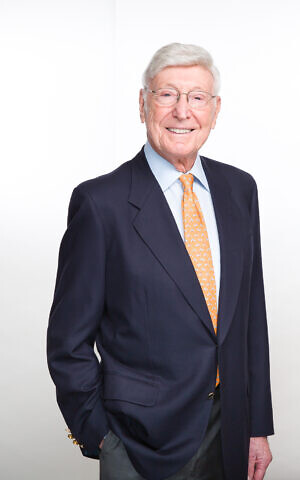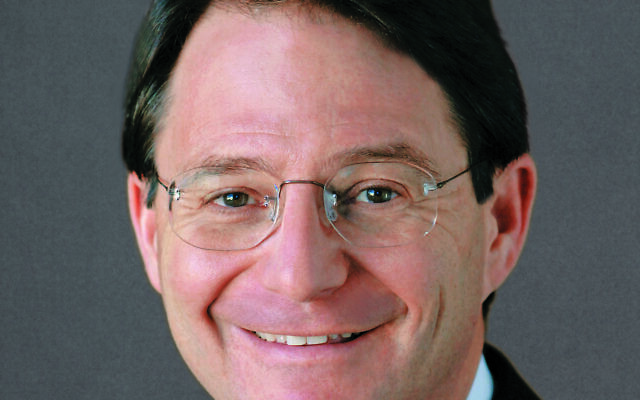Marcus Foundation’s New Medical Director
Dr. Jonathan Simons, founding director of Emory’s Winship Cancer Institute, returns to Atlanta with ‘tikkun olam’ in the form of entrepreneurial philanthropy in medical research.
You wouldn’t think a self-proclaimed Episcopalian Zionist would choose the term tikkun olam, the Jewish concept of repairing the world, to describe his internationally recognized medical career. But Dr. Jonathan Simons, The Marcus Foundation’s new full-time medical director and chief science officer, has it on good authority that his 30 years of entrepreneurial philanthropy for medical research, helping to channel new breakthrough therapies to market, qualifies as bringing about universal change.
In the new role he begins Aug. 1, Simons said he is excited about “the awesome opportunity and the awesome responsibility to leverage philanthropic awards, additional partners and teams of expert relationships to bring new lifesaving medicines and diagnostics” to market.
The founding director of Emory University’s Winship Cancer Institute was most recently CEO and president for 14 years of the Prostate Cancer Foundation in Santa Monica, Calif. There he led a team of scientists to gain U.S. Food and Drug Administration approval of 16 new therapies and formed the kind of “leveraged relationships” between medical scientists and funders he expects to develop in his new role.
He is looking forward to bringing his skills back to Atlanta, where he also taught and led medical programs at Emory and Georgia Tech. Simons will take over the Marcus Foundation role held for eight years by Dr. Fred Sanfilippo, who is retiring as a consultant and part-time medical director. The two share similar links to Johns Hopkins University, Emory and Georgia Tech.

Simons refers to Bernie Marcus, the founder of the Atlanta philanthropic organization, as a “genius” for his risk-taking when it comes to banking on “first-in-field” discoveries with the potential to move therapies from “test tube to clinic” to save, extend and improve quality of lives. “Bernie is a citizen-scientist … he has a real interest and appetite for strategic R&D risk-taking” when it comes to early clinical research, Simons said.
Healthcare and medical research represent the Marcus Foundation’s largest portfolio, with a focus on regenerative medicine and cellular therapy, integrative medicine, cancer, autism, heart and vascular health, stroke and neuroscience.
While Simons has been largely focused on cancer research, he said he is excited to apply his expertise to the Foundation’s other focus areas.
He added that he met Marcus when he funded the Marcus Nanotech Building at Georgia Tech. Simons co-directed the Emory-Georgia Tech Center of Cancer Nanotechnology Excellence. Marcus also asked Simons to advise over the years on various medical considerations.
Marcus said Simons was a natural fit for the position because of his previous relationship with the foundation as a member of its medical advisory committee for many years. “He’s pretty familiar with a lot of the things we’ve been doing up until now. … He knows our history and now he’s beginning to see all the things we are invested in, and the portfolio is very extensive,” Marcus said.
“Our medical science, our medical approach has gotten broader and in the years to come we are going to be spending more effort, more time and we needed a full-time doctor, medical director … and that’s why he’s on board now.”
He described Simons as extremely qualified, having made a major impact in lowering the number of deaths from prostate cancer, with an eagerness to expand his focus to the foundation’s wider medical scope. “He’s a very intense guy and very serious about medicine and I think all the things we are involved in are fascinating to him and things he wants to be involved with.”
Simons, a graduate of Princeton University and Johns Hopkins University School of Medicine, is considered a globally acclaimed physician-scientist, oncologist, investigator and “leader who brings a wealth of expertise in precision medicine drug discovery and development, cancer nanotechnology and genomics, and immunology, as well as healthcare administration,” according to the Foundation’s announcement about his hiring.
As chief science officer, Simons expects to better evaluate early biotech and early science in the clinic and combine that with his advisory role as medical director. The benefits of having a full-time medical director and chief science officer, Simons believes, is creating more opportunities for collaboration, which should speed new diagnostics and treatments to market “because that’s a beautiful and historic moment for patients.”
In terms of what the future holds for medical science, Simons points to immunotherapy and T-cell bioengineering, along with how some of the same immune system research that went into creating the COVID vaccine can be applied to treating cancer, as an alternative to chemotherapy.
Among the areas Marcus sees the foundation continuing to target are traumatic brain injuries and post-traumatic stress disorders among service personnel. In February, Marcus and Arthur Blank, co-founders of The Home Depot, partnered with actor Gary Sinise of “Forrest Gump” fame and his foundation’s Avalon Network to care for veterans and first responders suffering from post-traumatic stress disorder, traumatic brain injury and substance abuse.
“Twenty to 22 [veterans] a day are committing suicide and we really have to stop that, stop it in its tracks. There doesn’t seem to be an answer out there and the federal government and certainly the Veterans Administration does not have an answer.”
Another future focus area is using stem cells for COVID treatment, the clinical trials of which are underway, Marcus said. “But I hope to G-d COVID is not going to be the same issue as it’s been over the last two years. We need a reprieve. We need time off, all of us, and we need time to heal.”




comments